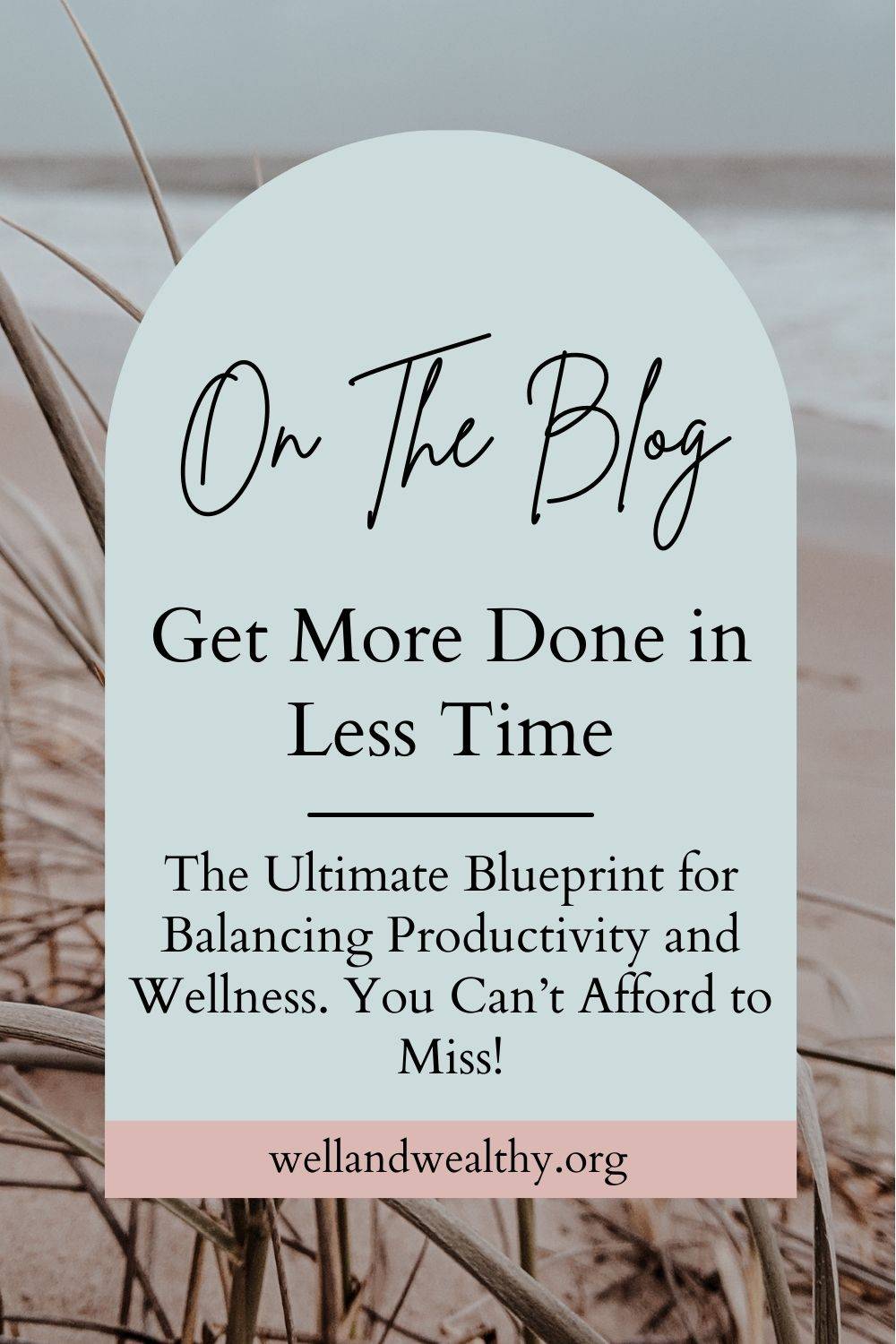Get More Done in Less Time: The Ultimate Blueprint for Balancing Productivity and Wellness. You Can’t Afford to Miss!
Let’s talk about something that’s been driving me crazy – and I bet it’s been bugging you too. That whole “I’m just bad at time management” story we tell ourselves? Yeah, I used to believe that one too.
But here’s the thing – when I finally paid attention to what my scattered schedule was doing to me, I realized it wasn’t just about missing deadlines or constantly rushing around like a headless chicken. This mess was seriously messing with my mental health.
And I mean seriously messing with it. We’re talking anxiety through the roof, stress levels that would make a coffee addict look chill, and some pretty dark days where depression decided to join the party. Not fun.
But don’t worry – this isn’t going to be another one of those “just wake up at 5am and your life will be perfect” guides. Because let’s be real, those never work. Instead, I’m going to share what actually helped me get my life together without losing my mind in the process.
Whether you’re drowning in to-do lists or just want to stop feeling like you’re always playing catch-up with your schedule, I’ve got your back. We’re going to walk through this together, with real strategies that actually work in the real world – not just in some productivity guru’s perfect universe.
Trust me, if I could figure this out (and help countless others do the same), you absolutely can too. Let’s get started!
Understanding the Time-Mental Health Connection
Ever notice how your brain feels like scrambled eggs when you can’t get your schedule under control? Yeah, me too. And turns out, there’s some pretty serious science behind why that happens.
Here’s the thing – I’ve spent years working with people struggling with time management (recovering time management disaster over here!), and there’s this pattern I keep seeing. When folks can’t get their schedule sorted, their mental health takes a nosedive faster than a seagull spotting french fries. The research backs this up too – feeling overwhelmed by time pressures can seriously mess with our mental wellbeing.
How Poor Time Management Messes With Your Head
Let me paint you a picture I see way too often: You’re behind on work, so you stress out. Because you’re stressed, you can’t focus. Because you can’t focus, you fall more behind. And round and round we go on this not-so-fun merry-go-round of doom.
The time-related stress gets real, folks. We’re talking about a global mental health crisis that’s costing us US$USD 6.10 trillion by 2030. That’s trillion with a T! And most of that? It’s from lost productivity because we’re all too stressed to function properly.
But wait, it gets worse (I know, I know, but stick with me here). Working late isn’t just annoying – it actually messes with your cortisol levels at night. And high cortisol is like letting a bull loose in your body’s china shop. It can:
- Tank your immune system (hello, constant colds!)
- Throw your stress response completely out of whack
- Make you about as emotionally stable as a chocolate teapot
- Lead to some pretty serious mood issues

Red Flags You Can’t Ignore
Through my work (and boy, have I seen it all), I’ve noticed some major warning signs that your time management is messing with your mental health. If you’re nodding along to any of these, consider it your wake-up call:
- Your anxiety’s through the roof about everyday stuff
- Your relationships are starting to feel the strain
- Work productivity? What productivity?
- You’re feeling overwhelmed 24/7
- Self-care? Never heard of her
Here’s what really gets me – people who keep pushing through when they’re unwell (you know who you are!) end up with higher rates of depression and more mental health-related absences. It’s like trying to drive your car on empty – eventually, you’re going to break down completely.
The bottom line? Your mental health and time management are basically besties – when one’s suffering, the other one’s going down too. But don’t worry, we’re about to fix that!
Creating a Personalized Time Management System
Okay, confession time: I used to be that person who bought every productivity planner under the sun, thinking each new time management system would finally be “the one.” Spoiler alert: none of them worked. Why? Because I was trying to squeeze myself into someone else’s system!
Finding Your Productivity Groove
Here’s what nobody tells you – your brain has its own unique way of working. Mind-blowing, right? Some of us are morning superstars while others don’t hit their stride until the streetlights come on. And get this – research shows that “Judging” personality types crush it at time management (80.03%) compared to “Prospecting” types (40.64%).
But this isn’t about slapping a label on yourself and calling it a day. It’s about working with your quirks instead of fighting them like a cat in a bathtub.
Matching Your Management Style to Your Personality
Through trial and error (and believe me, there was a LOT of error), I’ve figured out what works for different types of people:
- The Structure Lovers: Y’all need your calendars color-coded and your lists checked twice
- The Go-with-the-Flow Crew: Broader timeblocks are your friend – think finger painting, not connect-the-dots
- The Big Dream Team: Project-based planning is your jam
- The Detail Devils: Daily task lists make your heart sing
Fun fact: Observant types are way more confident about their time management (73.29%) than Intuitive types (50.43%). Translation? Concrete plans usually beat abstract ideas!
Creating Habits That Actually Stick
Listen, we’re not trying to turn you into a productivity robot here. The secret sauce to making this work? Building routines that feel as natural as your morning coffee craving. They need to be:
Real Talk Ready: Start where you are, not where Instagram thinks you should be
Flexible Like a Yoga Pro: Because life loves throwing curveballs
All About You: As unique as your fingerprint
Remember when I tried to force myself to be a 5am person because some guru said it was the only way to success? Yeah, that lasted about as long as my attempt at giving up chocolate. The truth is, even simple routines can work wonders for your productivity and mental health – no crack-of-dawn wake-up calls required!
Think of your time management system like a plant – it needs the right environment to grow, and what works for a cactus might drown an orchid. The goal isn’t to create the perfect system (spoiler: it doesn’t exist). It’s about growing one that works for YOU.
Digital Wellness and Time Management
Geez, let me tell you about the day I realized I’d checked my phone 127 times before lunch. Not kidding. And turns out, I’m not alone in this digital chaos – research shows we toggle between apps and websites about 1,200 times per day! That’s FOUR HOURS every week just trying to get our brain back on track after digital distractions.
Taming the Digital Dragon
Y’all, here’s something that’ll make you think twice about your Instagram habit – spending more than two hours per day on social media can seriously tank your self-esteem. Yikes.
But don’t panic! I’ve got what I call the “conscious connectivity” approach (fancy name, simple idea):
- Block out specific times for email-checking (because your inbox isn’t the boss of you)
- Get yourself an app blocker (trust me, Future You will be grateful)
- Create tech-free zones (your bathroom doesn’t need to be a mobile office)
- Take regular digital detoxes (the world won’t end if you’re offline for a bit)
Making Tech Work FOR You (Instead of Against You)
Here’s the funny thing – technology is like that friend who can either be your best wing-person or totally sabotage your night out. Did you know 94% of recruiters use social media when hiring? So we can’t just ghost our devices completely (though sometimes I really want to!)
Setting Those Digital Boundaries
Winner, winner! I finally cracked the code on this one. I call it my “digital sunset rules” (because it sounds way cooler than “please stop scrolling TikTok at 3am”):
Morning Routine: Keep those hands off your phone for the first hour after waking (I know, I know, but try it!)
Work Hours: Follow the 20-20-20 rule – every 20 minutes, look 20 feet away for 20 seconds (your eyes will thank you)
Evening Wind-down: No screens 1-2 hours before bed (Netflix will still be there tomorrow)
Look, I’m not saying you need to go full digital hermit here. But if you’re anything like me, your relationship with technology might need couples counseling. Setting these boundaries has helped my clients go from digital disaster to productivity master – and it can work for you too!
Implementing Stress-Conscious Productivity Methods
Okay, let me tell you about the time I nearly burned myself out trying all the productivity hacks at once. Not my finest moment! But through that mess (and trust me, it was a mess), I discovered something pretty life-changing: working smarter beats working harder every single time.

The Pomodoro Technique: But Make It Flexible!
You know that famous Pomodoro thing where you work for 25 minutes straight? Yeah, that wasn’t cutting it for me. Research shows we lose up to four hours per week just switching between tasks. Ouch!
So I created what I call the “Flowmodoro” approach (fancy name, I know). Instead of sticking to rigid 25-minute blocks like your life depends on it, you work with your natural focus patterns. Because some days you’re on fire and can work for an hour straight, and other days… well, let’s just say getting through 10 minutes feels like climbing Mount Everest.
Prioritization That Won’t Make You Cry
As a recovering perfectionist (and boy, do I mean recovering), I’ve developed what I call my “Sanity-Saving Priority System”:
- Must-Do: The “house is on fire” level stuff
- Should-Do: Important but won’t cause disasters if delayed
- Could-Do: Nice to have but won’t lose sleep over
- Won’t-Do: Nope, not happening, bye-bye! (This list is my favorite)
The Art of Strategic Slacking (Yes, Really!)
Winner, winner! Here’s the game-changer – taking regular breaks actually increases productivity! I’m not talking about those sad little coffee-runs-while-checking-email breaks. I mean proper “mental reset intervals” where you actually let your brain breathe.
Studies show these breaks can prevent burnout and boost learning retention. Translation? You’re not being lazy, you’re being strategic! Some of my favorite reset activities:
- Walking around the block (bonus points if you leave your phone behind)
- Deep breathing (without simultaneously checking Slack)
- Stretching (no, reaching for your coffee doesn’t count)
Remember folks, you’re not a machine – you’re a human being with a brain that needs regular recharging. Think of productivity like a dance, not a marathon. Sometimes you need to slow down to speed up!
Building Long-term Time Management Habits
Want to know my biggest “aha!” moment about time management? It wasn’t about finding the perfect morning routine or the best productivity app. Nope. It was realizing that lasting change needs way more than just motivation and a pretty planner.
Creating Habits That Actually Stick
Here’s something that’ll blow your mind – it takes 66 days for a new habit to become automatic. Not 21 days like everyone keeps saying. Sixty-six days, people!
After falling off the productivity wagon more times than I can count (hello, that time I tried to become a 5am person and lasted exactly two days), I’ve figured out what actually works:
- Start so small it feels ridiculous (like, “check my calendar once a day” small)
- Piggyback on stuff you already do (coffee = planning time)
- Track your wins without beating yourself up
- Celebrate EVERYTHING (even checking that one email you’ve been avoiding)

When Everything Goes Sideways
Let’s get real for a second – about 80% of people ditch their new habits faster than a hot potato. Why? Because life happens, stress hits, and suddenly your beautiful new system feels about as manageable as juggling flaming chainsaws.
I’ve seen it all with my clients (and lived it myself). Here’s what usually trips people up:
- Trying to change ALL THE THINGS at once (rookie mistake)
- Expecting overnight miracles (sorry, we’re not in a movie)
- Going solo when you need a cheerleader
- Getting ambushed by old habits (looking at you, procrastination)
Keeping the Momentum Going
Want to know something cool? People who stick with structured time management report 40% lower stress levels. That’s like getting a free massage for your brain every day!
I’ve developed what I call the “Progress-Pause-Pivot” method (because who doesn’t love a little alliteration):
- Progress: Notice the tiny wins (Did you write your to-do list? VICTORY!)
- Pause: Take time to reflect (What’s working? What makes you want to throw your planner out the window?)
- Pivot: Adjust your approach (Because sometimes Plan A… and B… and C… don’t work)
Remember, we’re aiming for progress, not perfection here. It’s like learning to dance – you’re gonna step on some toes, but eventually, you’ll find your rhythm. And trust me, when you do? It’s totally worth all those awkward stumbles along the way!
Conclusion
Whew, we’ve covered a lot of ground here! And you know what? After all this talk about time management, I want to let you in on something important – this isn’t about cramming more stuff into your already packed days. Please don’t do that.
Here’s what I really want you to take away: Managing your time well is like giving your brain a big, warm hug. It’s about creating space to breathe, to think, and yes, even to mess up sometimes (because trust me, we all do).\
Get Your Hands On Our
I used to think I needed to follow someone else’s perfect system to get my life together. Spoiler alert: that was a disaster. What actually worked? Tiny changes that felt right for me. Setting boundaries with my phone. Taking breaks without guilt. Finding my own rhythm instead of dancing to someone else’s beat.
And you know what happened? Not only did I get more done, but my anxiety dropped, my mood improved, and – this is the crazy part – I actually started enjoying my days more.
So here’s my challenge to you: Start small. Like, really small. Maybe it’s just checking your calendar once a day, or taking one proper lunch break this week. Whatever feels doable for YOU.
Because at the end of the day, this isn’t about becoming some productivity superhero. It’s about creating a life that feels good from the inside out. And trust me, you’ve totally got this!
Now, I’d love to hear from you – what’s one tiny change you’re going to try this week? Drop it in the comments below!








